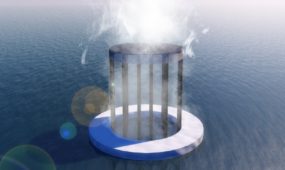DNA research projects honoured at Eureka Awards
Research & Development
Tests to detect cancer DNA in bowel cancer patients and a project to track the genetic heritage of the world’s oldest continuous culture are among the winners of Australia’s most comprehensive science awards for 2017.

Sign up to receive notifications about new stories in this category.
Thank you for subscribing to story notifications.
Winners of the Australian Museum Eureka Prizes were announced across 16 categories this week.
Among the winners were Flinders University Professor in Gastroenterology Graeme Young and the Colvera Team, which developed a clinically validated blood test to detect cancer DNA in the blood plasma of bowel cancer patients.
The Colvera Team in partnership with Flinders University, CSIRO, and biotech company Clinical Genomics Pty Ltd, developed the new blood test that is proven to be twice as effective as existing non-invasive blood testing methods to detect bowel cancer. The research won the 2017 Australian Johnson & Johnson Eureka Prize for Innovation in Medical Research.
Professor Young’s projects at the Flinders Centre for Innovation in Cancer in South Australia include establishing the Australian National Bowel Cancer Screening program, which seeks to make early detection of Bowel cancers in people aged over 50.
“One of the principles in managing bowel cancer is, the smaller the tumour, the earlier you get it, the better the recovery,” Professor Young said.
“Colvera allows us to detect recurrent bowel cancer at an earlier stage and when it is at a smaller size.”
Professor Young will present the new blood test technology at the 25th United European Gastroenterology Conference in Spain in October.
The University of Adelaide’s Australian Centre for Ancient DNA, also in South Australia, was awarded the UNSW Eureka Prize for Excellence in Interdisciplinary Scientific Research. The centre was recognised for creating the first genetic map of Aboriginal Australia before European arrival.
The Aboriginal Heritage Project research uses DNA from historical hair samples collected from Aboriginal people across Australia.
The samples were collected from expeditions conducted by the South Australian Museum since the 1920s. Detailed information about birthplaces, family history, audio and written records were also used in the project.
The map aims to be a critical resource for people of Aboriginal descent who are culturally disconnected or members of the stolen generation. The map also aims to be used as an education tool for the broader Australian public.
“Australia constitutes one of the oldest and most important chapters in human history and yet it remains one of the least understood,” says project leader and Director of ACAD, Professor Alan Cooper.
“The Aboriginal Heritage Project is reconstructing the missing history and the details of some 50,000 years of Aboriginal heritage.
The project, in partnership with the South Australian Museum, is set to run for a decade and will involve analysis from more than 1000 individuals from around Australia.
A full list of 2017 Australian Museum Eureka prize winners is available here.
Known as the Oscars of Science in Australia, the Eureka Prizes are the country’s most comprehensive national science awards, honouring excellence in Research and Innovation, Leadership, Science Engagement and School Science. They have been presented annually by the Australian Museum since 1990.
Jump to next article



